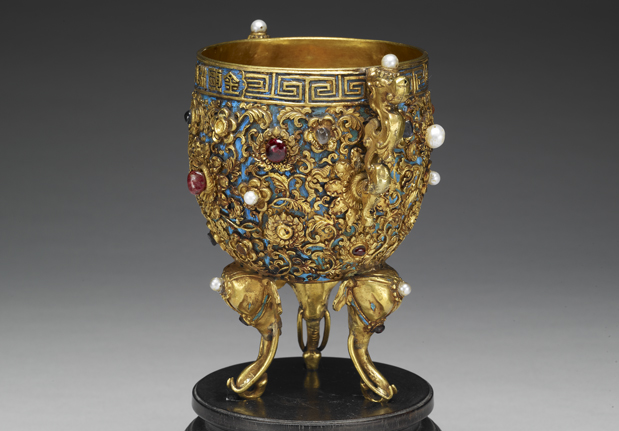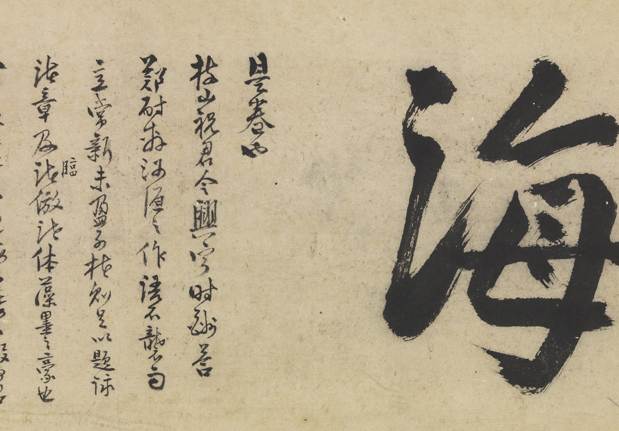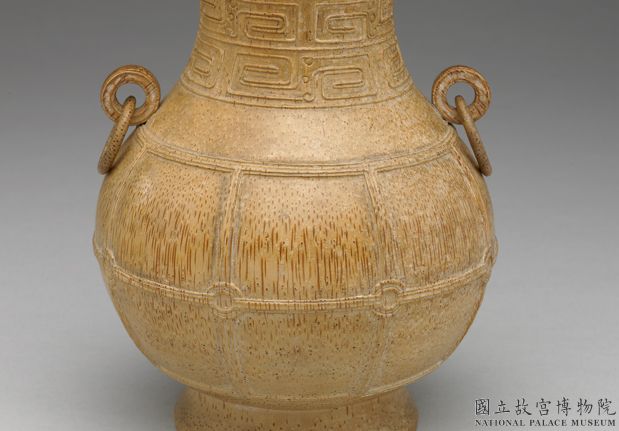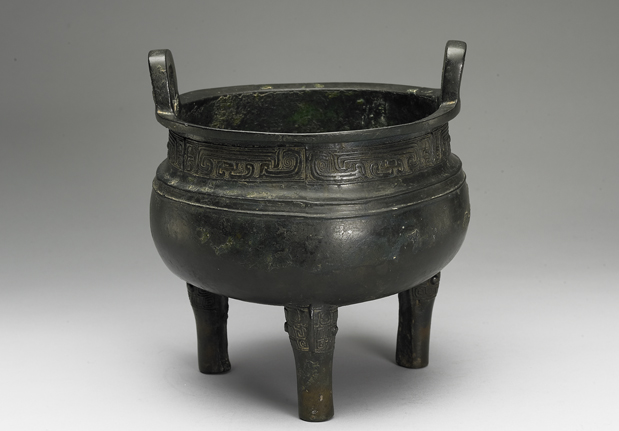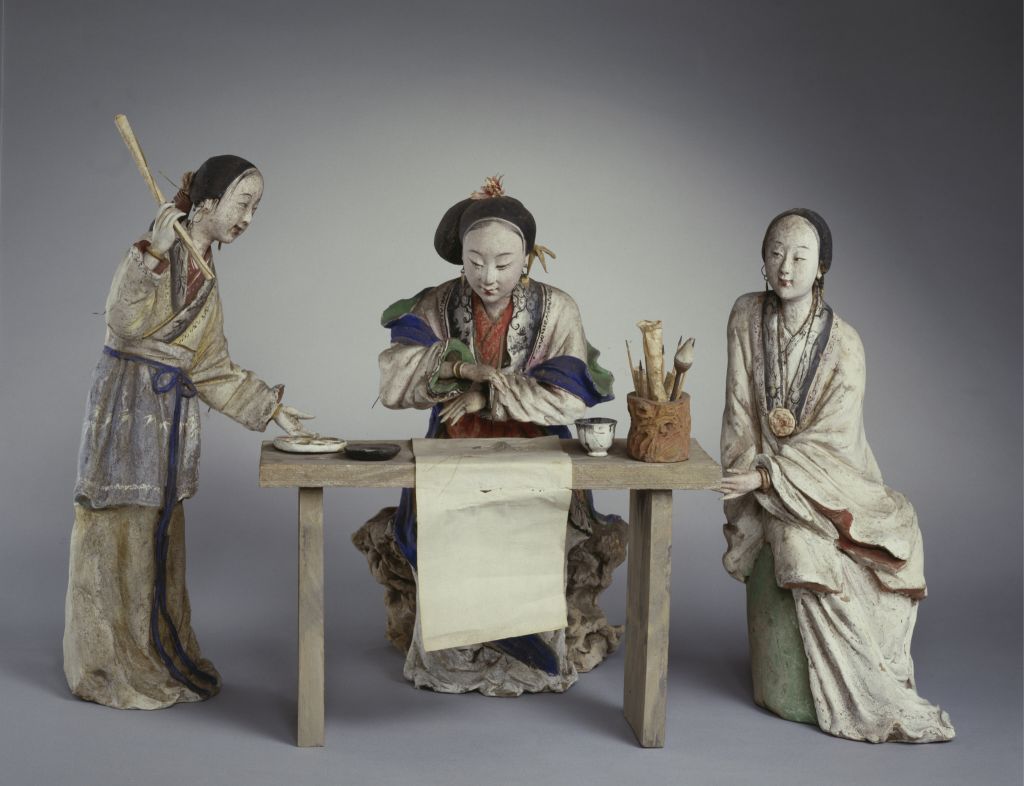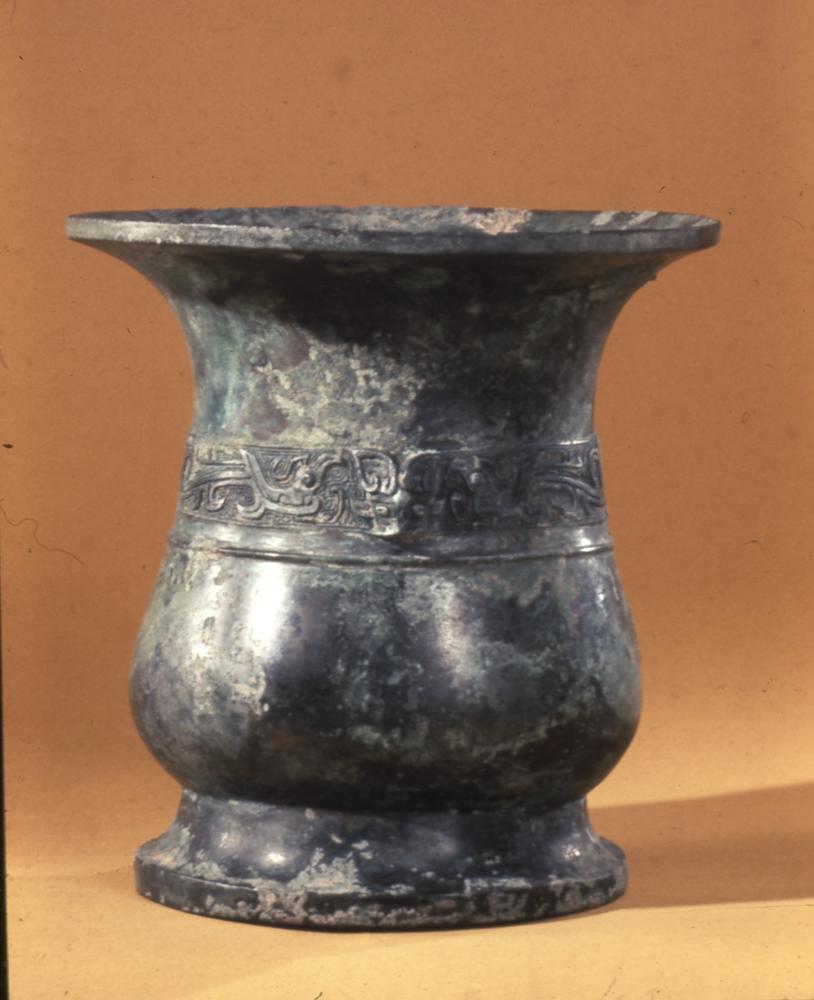[Zang Huaike Stele]
33.5 × 33.5 cm
Clear rubbings. The words “gain” and “bren” have been damaged, while the words “horse”, “humble” and “yu” have not been damaged. Donated by Zhu Yiyu and his family. The stone is now in Xi’an Stele Forest Museum, Shaanxi
The first year of Tang Guangde (763). Yan Zhenqing wrote the book and Li Xiuyan wrote it. Strong and vigorous, strong and strong
Description of the Catalogue of Steles in Ouzhai Collection:
Zang Zhenjie Stele
The first year of Guangde. Yan Zhenqing. Xin Wei trudges on his own. Thirty nine. Go back two times. One volume. Xinwei bought in Fuhua Pavilion in May. The price is forty yuan
According to the Ouzhai Graphite Inscription and Postscript:
Zang Zhenjie Stele
The first year of Guangde (763). Yan Zhenqing. Xin Wei trudges on his own. One volume
At the end of the inscription, the words “to be announced to Guangluqing Li Xiuyan”, “Jin Xie Lin Lang” and “Jin Shi Cui Bian” are interpreted as “seal amount” and “title amount”. After careful review, neither of them is true. The upper word is “Yi”, and the next word is “taboo”. Injecting means pumping and injecting. It means pumping the words that are taboo in the space of stone to inject. Qian Zhuting’s “New Record of Ten Jays” is quoted from the stele of Xu Hao, the second son of Hao, written by Peng Wang Fu. At the end of the stele, “Uncle Zhang Ping, the cousin of Henan Province, who joined the army, said that it was taboo”. The stone tablet carved in the Yuan Dynasty was written by Polu Chong, whose son, Polu Yuanshu, “Nanyang Gongshi Li Di filled in the taboo”, which is the example of Xu Xian. Ye Jushang’s “Yu Shi” cited the epitaph of Zhang Rui in the ninth year of the Dali period of the Tang Dynasty, the text of Qian Ting Shun, the book of his father Zhang (Zhan), and the “taboo of his brother-in-law Li Xihua”. The judge of Song Huangzhou took up the political position of Wei Jie Kuang Chi, and the judge of Jiading Guiwei took up the position of Ru Liwen in March next year. Later, he also filled in his name. In the first year of Baoyou’s reign, he took the imperial instrument Zhang Xun Kuang Chi, and later said, “Children, grandchildren, etc., Liu Yangzu filled in the taboo”. Yu Shizhi, the wife of Yiguo, said, “Zhao Mengrong, the orphan son of Yihai, was sobbing with blood and was mindful, and Zhao Shimi, the late family member, was not allowed to fill in the taboo.”. According to the above quotations, they are all examples of later filling in Xiengzhi. The difference is that the Tang Dynasty is “title”, and the Song Dynasty has used “fill” ears since then, but none of them is as good as this tablet. It can be seen that the word “Yitaboo”. Most rubbings can’t be identified, so since the Ming Dynasty, all the writers have taken it as their intention, either the amount of cloud seal, or the amount of cloud title, so that the inscription on the Tang tablet is taboo, and no one knows that there is a difference between the two. According to Yiyi, it is similar to the meaning of filling, and its elegant precepts, Shuowen: Yiyi, Shuoye, also has the meaning of expressing. However, the Tang and Song stones cited by the two families are taboo. Zhang Ruizhi’s father is taboo for his son, and his example is only. If this tablet is written by the Duke of Lu, why should it be used as an example of injecting taboos? This is inexplicable. The word “Huaike” in the tablet has no vitality, and it is not like Lu Gongshu. It is undoubtedly imitated from Xiuyan. In addition, the inscription “On August 23rd of the second year of the Kaiyuan era, the imperial edict said that it was the official official”, which was the evidence that Duke Lu did not fill in. Later, he entered the stone with the word “public”, which seemed to be the place where the inspection was lost. The following five words, “Wei Bei Jie Du Shi”, are not similar to Lu Gongshu, or when entering the stone, they are supplemented by those who have studied the North Sea Book. On April 22nd of Xinweixia, when reading this tablet, I found that the book was written in the back
![图片[1]-Zang Huaike Stele-China Archive](https://chinaarchive.net/Ming dynasty/Inscription/61750[1024].jpg)
![臧怀恪碑(册页1) 图片[2]-Zang Huaike Stele-China Archive](https://chinaarchive.net/Ming dynasty/Inscription/61749[1024].jpg) 臧怀恪碑(册页1)
臧怀恪碑(册页1)![臧怀恪碑(册页2) 图片[3]-Zang Huaike Stele-China Archive](https://chinaarchive.net/Ming dynasty/Inscription/61748[1024].jpg) 臧怀恪碑(册页2)
臧怀恪碑(册页2)![臧怀恪碑(册页3) 图片[4]-Zang Huaike Stele-China Archive](https://chinaarchive.net/Ming dynasty/Inscription/61747[1024].jpg) 臧怀恪碑(册页3)
臧怀恪碑(册页3)![臧怀恪碑(册页4) 图片[5]-Zang Huaike Stele-China Archive](https://chinaarchive.net/Ming dynasty/Inscription/61746[1024].jpg) 臧怀恪碑(册页4)
臧怀恪碑(册页4)![臧怀恪碑(册页5) 图片[6]-Zang Huaike Stele-China Archive](https://chinaarchive.net/Ming dynasty/Inscription/61745[1024].jpg) 臧怀恪碑(册页5)
臧怀恪碑(册页5)![臧怀恪碑(册页6) 图片[7]-Zang Huaike Stele-China Archive](https://chinaarchive.net/Ming dynasty/Inscription/61744[1024].jpg) 臧怀恪碑(册页6)
臧怀恪碑(册页6)![臧怀恪碑(册页7) 图片[8]-Zang Huaike Stele-China Archive](https://chinaarchive.net/Ming dynasty/Inscription/61743[1024].jpg) 臧怀恪碑(册页7)
臧怀恪碑(册页7)![臧怀恪碑(册页8) 图片[9]-Zang Huaike Stele-China Archive](https://chinaarchive.net/Ming dynasty/Inscription/61742[1024].jpg) 臧怀恪碑(册页8)
臧怀恪碑(册页8)![臧怀恪碑(册页9) 图片[10]-Zang Huaike Stele-China Archive](https://chinaarchive.net/Ming dynasty/Inscription/61741[1024].jpg) 臧怀恪碑(册页9)
臧怀恪碑(册页9)![臧怀恪碑(册页10) 图片[11]-Zang Huaike Stele-China Archive](https://chinaarchive.net/Ming dynasty/Inscription/61740[1024].jpg) 臧怀恪碑(册页10)
臧怀恪碑(册页10)![臧怀恪碑(册页11) 图片[12]-Zang Huaike Stele-China Archive](https://chinaarchive.net/Ming dynasty/Inscription/61739[1024].jpg) 臧怀恪碑(册页11)
臧怀恪碑(册页11)![臧怀恪碑(册页12) 图片[13]-Zang Huaike Stele-China Archive](https://chinaarchive.net/Ming dynasty/Inscription/61738[1024].jpg) 臧怀恪碑(册页12)
臧怀恪碑(册页12)![臧怀恪碑(册页13) 图片[14]-Zang Huaike Stele-China Archive](https://chinaarchive.net/Ming dynasty/Inscription/61737[1024].jpg) 臧怀恪碑(册页13)
臧怀恪碑(册页13)![臧怀恪碑(册页14) 图片[15]-Zang Huaike Stele-China Archive](https://chinaarchive.net/Ming dynasty/Inscription/61736[1024].jpg) 臧怀恪碑(册页14)
臧怀恪碑(册页14)![臧怀恪碑(册页15) 图片[16]-Zang Huaike Stele-China Archive](https://chinaarchive.net/Ming dynasty/Inscription/61735[1024].jpg) 臧怀恪碑(册页15)
臧怀恪碑(册页15)![臧怀恪碑(册页16) 图片[17]-Zang Huaike Stele-China Archive](https://chinaarchive.net/Ming dynasty/Inscription/61734[1024].jpg) 臧怀恪碑(册页16)
臧怀恪碑(册页16)![臧怀恪碑(册页17) 图片[18]-Zang Huaike Stele-China Archive](https://chinaarchive.net/Ming dynasty/Inscription/61733[1024].jpg) 臧怀恪碑(册页17)
臧怀恪碑(册页17)![臧怀恪碑(册页18) 图片[19]-Zang Huaike Stele-China Archive](https://chinaarchive.net/Ming dynasty/Inscription/61732[1024].jpg) 臧怀恪碑(册页18)
臧怀恪碑(册页18)![臧怀恪碑(册页19) 图片[20]-Zang Huaike Stele-China Archive](https://chinaarchive.net/Ming dynasty/Inscription/61731[1024].jpg) 臧怀恪碑(册页19)
臧怀恪碑(册页19)![臧怀恪碑(册页20) 图片[21]-Zang Huaike Stele-China Archive](https://chinaarchive.net/Ming dynasty/Inscription/61730[1024].jpg) 臧怀恪碑(册页20)
臧怀恪碑(册页20)![臧怀恪碑(册页21) 图片[22]-Zang Huaike Stele-China Archive](https://chinaarchive.net/Ming dynasty/Inscription/61729[1024].jpg) 臧怀恪碑(册页21)
臧怀恪碑(册页21)![臧怀恪碑(册页22) 图片[23]-Zang Huaike Stele-China Archive](https://chinaarchive.net/Ming dynasty/Inscription/61728[1024].jpg) 臧怀恪碑(册页22)
臧怀恪碑(册页22)![臧怀恪碑(册页23) 图片[24]-Zang Huaike Stele-China Archive](https://chinaarchive.net/Ming dynasty/Inscription/61727[1024].jpg) 臧怀恪碑(册页23)
臧怀恪碑(册页23)![臧怀恪碑(册页24) 图片[25]-Zang Huaike Stele-China Archive](https://chinaarchive.net/Ming dynasty/Inscription/61726[1024].jpg) 臧怀恪碑(册页24)
臧怀恪碑(册页24)![臧怀恪碑(册页25) 图片[26]-Zang Huaike Stele-China Archive](https://chinaarchive.net/Ming dynasty/Inscription/61725[1024].jpg) 臧怀恪碑(册页25)
臧怀恪碑(册页25)![臧怀恪碑(册页26) 图片[27]-Zang Huaike Stele-China Archive](https://chinaarchive.net/Ming dynasty/Inscription/61724[1024].jpg) 臧怀恪碑(册页26)
臧怀恪碑(册页26)![臧怀恪碑(册页27) 图片[28]-Zang Huaike Stele-China Archive](https://chinaarchive.net/Ming dynasty/Inscription/61723[1024].jpg) 臧怀恪碑(册页27)
臧怀恪碑(册页27)![臧怀恪碑(册页28) 图片[29]-Zang Huaike Stele-China Archive](https://chinaarchive.net/Ming dynasty/Inscription/61722[1024].jpg) 臧怀恪碑(册页28)
臧怀恪碑(册页28)![臧怀恪碑(册页29) 图片[30]-Zang Huaike Stele-China Archive](https://chinaarchive.net/Ming dynasty/Inscription/61721[1024].jpg) 臧怀恪碑(册页29)
臧怀恪碑(册页29)![臧怀恪碑(册页30) 图片[31]-Zang Huaike Stele-China Archive](https://chinaarchive.net/Ming dynasty/Inscription/61720[1024].jpg) 臧怀恪碑(册页30)
臧怀恪碑(册页30)![臧怀恪碑(册页31) 图片[32]-Zang Huaike Stele-China Archive](https://chinaarchive.net/Ming dynasty/Inscription/61719[1024].jpg) 臧怀恪碑(册页31)
臧怀恪碑(册页31)![臧怀恪碑(册页32) 图片[33]-Zang Huaike Stele-China Archive](https://chinaarchive.net/Ming dynasty/Inscription/61718[1024].jpg) 臧怀恪碑(册页32)
臧怀恪碑(册页32)![臧怀恪碑(册页33) 图片[34]-Zang Huaike Stele-China Archive](https://chinaarchive.net/Ming dynasty/Inscription/61717[1024].jpg) 臧怀恪碑(册页33)
臧怀恪碑(册页33)![臧怀恪碑(册页34) 图片[35]-Zang Huaike Stele-China Archive](https://chinaarchive.net/Ming dynasty/Inscription/61716[1024].jpg) 臧怀恪碑(册页34)
臧怀恪碑(册页34)![臧怀恪碑(册页35) 图片[36]-Zang Huaike Stele-China Archive](https://chinaarchive.net/Ming dynasty/Inscription/61715[1024].jpg) 臧怀恪碑(册页35)
臧怀恪碑(册页35)![臧怀恪碑(册页36) 图片[37]-Zang Huaike Stele-China Archive](https://chinaarchive.net/Ming dynasty/Inscription/61714[1024].jpg) 臧怀恪碑(册页36)
臧怀恪碑(册页36)![臧怀恪碑(册页37) 图片[38]-Zang Huaike Stele-China Archive](https://chinaarchive.net/Ming dynasty/Inscription/61713[1024].jpg) 臧怀恪碑(册页37)
臧怀恪碑(册页37)![臧怀恪碑(册页38) 图片[39]-Zang Huaike Stele-China Archive](https://chinaarchive.net/Ming dynasty/Inscription/61712[1024].jpg) 臧怀恪碑(册页38)
臧怀恪碑(册页38)![臧怀恪碑(册页39) 图片[40]-Zang Huaike Stele-China Archive](https://chinaarchive.net/Ming dynasty/Inscription/61711[1024].jpg) 臧怀恪碑(册页39)
臧怀恪碑(册页39)![臧怀恪碑(册页40) 图片[41]-Zang Huaike Stele-China Archive](https://chinaarchive.net/Ming dynasty/Inscription/61710[1024].jpg) 臧怀恪碑(册页40)
臧怀恪碑(册页40)![臧怀恪碑(册页41) 图片[42]-Zang Huaike Stele-China Archive](https://chinaarchive.net/Ming dynasty/Inscription/61709[1024].jpg) 臧怀恪碑(册页41)
臧怀恪碑(册页41)
